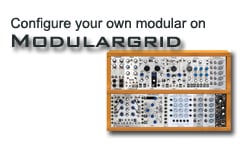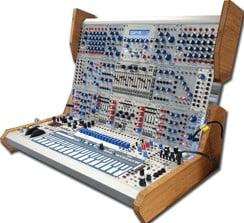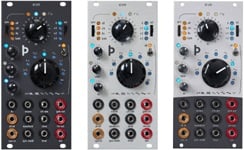alternative available!
Mutable Instruments Clouds (EOL)
OverviewMutable Instruments Clouds (End of Life) Sold Out
Texture synthesizer
Overview
Clouds is a granular audio processor – with a couple of twists.
Unlike granular sample players, Clouds is focused on the realtime granularization of incoming audio signals, and the acquisition of textures from them.
Classic controls such as grain position, size, and pitch are provided. Clouds can superimpose many grains simultaneously (at least 40, depending on the CPU used by its other features) and thus create thick textures. Control over texture density, independently of grain size, is thus provided. An external trigger input allows grains to be seeded in sync with LFOs or rhythmic generators.
To provide a richer variety of timbres, Clouds allows the shape of the grain’s envelope to be morphed – from sharp rectangular edges to a smooth bell curve. In addition, a diffusion network can further dissolve the edges of grains into blurry textures.
Finally, to cover various applications of granular synthesis without the need for additional modules, Clouds’ comes with four “blending” settings for mixing and re-routing its output signal: dry/wet balance, random panning amount, feedback amount, and reverberation amount. Voltage control over one of those four parameters is possible.
Clouds’ delay memory ranges from 1s to 8s depending on audio quality settings.
Other surprises have been packed in Clouds, including alternative looping delay and pitch-shift/time-stretch modes… and a very strange spectral buffer freeze/glitch.
Granular audio processor. Granularizes in real-time the incoming audio stream or the “frozen” delay/recording buffer.
Features
- Recording buffer duration: 1s (32kHz, 16-bit, stereo) to 8s (16kHz, 8-bit µ-law, mono). 4 quality settings.
- Grain size: 16ms to 1s.
- Maximum number of concurrent grains: 40 to 60 depending on recording buffer resolution.
- Grain generation time-base: periodical, randomized, or externally clocked.
- Grain envelopes: continuously variable between boxcar, triangle, Hann.
- Playback modes: granular, microlooper/buffer-lock, time-domain pitch-shifter/time-stretcher (WSOLA), ????.
- 4-AP diffuser to post-process the granularized signal.
- Post processing (blending) settings: dry/wet balance, random panning amount, feedback amount, reverb amount.
- 4 memory locations for “frozen” recording buffers.
Controls
- Freeze push-button.
- Blending setting (or audio quality) selection button.
- Load/save button.
- Grain position, size and pitch knobs.
- Input gain knob, -18dB to 6dB.
- Grain density and texture knobs.
- Multi-function “Blending mode” knob.
Inputs and outputs
- Buffer freeze gate input.
- Grain generation trigger input.
- Grain position CV.
- Grain size CV.
- Pitch-shifting/transposition 1V/Oct CV.
- Dry/wet CV (or feedback, balance, reverb amount – depending on blend mode).
- Grain density CV.
- Grain texture/timbre CV.
- 2-channel audio input (line-level, with pre-amplifier/attenuator).
- 2-channel audio output (modular level).
Technical characteristics
- Input impedances: 100k.
- CV range: +/- 5V. CVs outside of this range are simply clipped.
- Internal processing: 32kHz, 32-bit floating point. RAM Recording buffer uses 16-bit (high quality) or 8-bit µ-law (low quality) resolution.
- Open-source hardware and firmware.
- Easy firmware updates through an audio interface.
- Cortex-M4 ARM processor.
- 18-HP.
- Current consumption: +12V: 120mA ; -12V: 10mA.
- Manual




